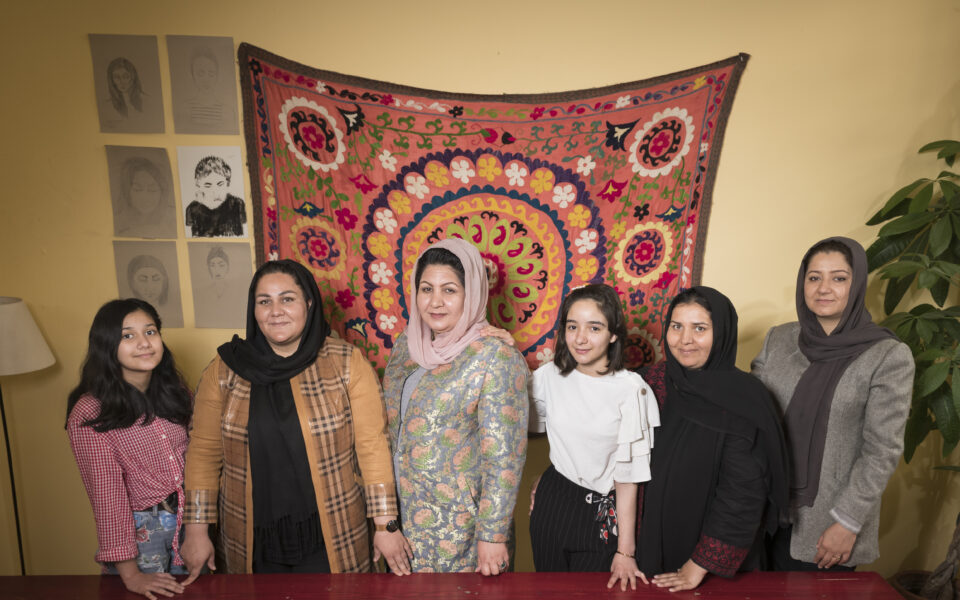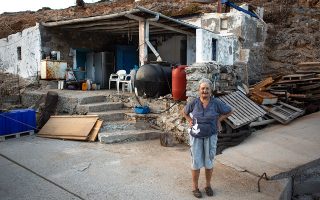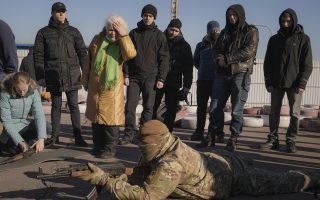Influential Afghan women regrouping in Greece
Politicians, educators, journalists, judges and others facing persecution under Taliban rule establish new organization in Athens

I am greeted by the aroma of freshly brewed tea and the smiles of a group of women sitting on two small sofas as I enter the neoclassical Athens building that is home to the Melissa Network of Migrant Women in Greece. Together with the big wooden table and the colorful Afghan rug hanging on the wall behind it, there is little in this homey space to suggest that for the past seven months it has been used to host gatherings of exiled Afghan women – lawmakers, judges, journalists and government employees. The women I am meeting with are all leading members of the newly established Afghan Women Parliamentarians and Leaders Network (AWPLN).
“This is the first ever political initiative of its kind, one with an oppositional character, run by women,” says Nadina Christopoulou, director and co-founder of Melissa, which, among others, helped these women leave the country after the Taliban violently seized control again on August 15, 2021.
The AWPLN was set up within a week of their arrival in Greece, which for most is not the final destination, but a bridge. They organized the endeavor on the road, while fleeing certain persecution as the Taliban cracked down on women, and especially those in the public eye. Many of them did not know each other before, but became close during their journey to Greece, which had been organized by Melissa and various other international organizations. “We didn’t think that people we had never met before would trust us with their lives, that our lives would become so inextricably linked,” says Nadina.
The women make me feel at home, but they still cannot smile for the camera. This not the case for the daughters among them, Noorina, 11, and Elhama, 13. I ask Noorina to recount what she remembers of the journey, how she felt. “I was happy, on the one hand, because we were leaving, but I was also sad because we were leaving our country behind. We were very excited about being able to go back to school though, to follow our dreams,” she says, referring to the Taliban’s imposition of strict Sharia laws that forbid girls from attending school above sixth grade, despite initial assurances that the days of such curbs on girls and women were over.
I ask Noorina what she misses most from back home. “My father,” she says. “He’s still over there.” The 11-year-old says she’d like to go back, but only after finishing school. “Maybe the Taliban will be gone by then. I want to study politics and become a professor. I will go back and share my knowledge and experience with our people, who will be free. I want to become president of Afghanistan.”
Elhama is no less ambitious. “I want to go to university in Canada, become an astronaut and go to the moon,” she says.
We move our conversation to the porch, which is overlooked by the surrounding apartment blocks. The girls say they like Greece and are still excited by their recent excursion to Ancient Olympia. “People in the countryside are nicer than Athenians,” they say. “People in Athens look angry all the time.” As if to prove their point, a woman from a nearby apartment building tells us off for making noise; she’s bothered by the children’s laughter. I am later told of an incident involving neighbors throwing bottles at the women, some of whom were even pregnant.
Nazifa Yusufi Bek was a lawmaker who represented the Takhar region in the Afghan parliament. Now she’s president of the AWPLN. She keeps getting messages on her phone that bring tears to her eyes. I learn that she’s trying to reach her mother. Most of these women left loved ones behind or lost others in the fighting. They’re looking ahead, but also back.
“I have this image imprinted on my mind,” Nazifa says of her last memory before she fled. “We had so many victims. We lost so many young people who were enlisted in the Afghan military. The day we were supposed to leave, there was an explosion at the airport and more than a thousand people died or were injured. That is our main memory. That and the feeling of watching a system of governance collapse. It fell in 24 hours and, just like that, everything was over.”
Homa Ahmadi represented Logar province and is a founding member of AWPLN and Elhama’s mother. “We lost everything when the Taliban took over Afghanistan: our identities, our homes, our sisters, our jobs, our opportunities, our infrastructure,” she says. “We tried to leave on August 26, but there was the explosion at the airport. The children were terrified, my youngest daughter was in shock. It was very dangerous. We hid in the home of a relative. We left Kabul on September 20 in an evacuation coordinated by the international community. We went to Herat and from there to Tehran, then Georgia and finally Greece.
“Most of the people who left Afghanistan on rescue flights were part of the country’s elite: educators or government officials. They left with a completely uncertain future. They were the eyes and ears of the Afghan society and now they have nothing,” says Homa.
While this may seem like unfair privilege to some, Nadina puts it in perspective. “You take the hive out of the flaming forest, not to save that particular colony, but also a critical mass of individuals that may be able to put down roots somewhere else and create a new colony when doing so inside the country is no longer possible,” she says.
Surely these women – who have spent their careers fighting for gender equality and the rights of other Afghan women – feel some guilt for leaving. “It felt essential for us to be in Afghanistan, among our people. Unfortunately, the situation was simply too dangerous. Our message is that we are very sorry about what’s happening in our country, but we’re trying. We’re trying to raise awareness in the international community, to do something for the people who still live in very perilous conditions,” says Nazifa.
Before the Taliban seized power last year, the landmark UN Security Council Resolution 1325 stated that women in Afghanistan had to have meaningful participation in the country’s governance. That has been entirely reversed today. “With our work at the network, we want to dedicate all of our time and energy to doing something special for our people, to bringing them out of the darkness and into the light,” says Homa. “We want to fight for the women even in Afghanistan’s remotest parts, women who do not have a voice, who have no rights.”
The women of AWPLN don’t just care about their fellow Afghans; they’re also concerned by the plight of all refugees. “When they live in camps without opportunities and without being able to send their children to school, there is nothing they can do for them and the children are the future,” says Homa.
Nazifa is also concerned about where international aid to Afghanistan is going. “The senators, lawmakers and members of civil society have all left the country, so these donations are going to the Taliban, which is not distributing them to the people in need,” she warns.
When I ask the women what they hope for their children in the future, Homa is unequivocal: “I want my children to complete their education, to do a master’s and PhD. As a woman in Afghanistan, with 30 years of war, it was a huge struggle for me, but I got educated, I got a job. I want my children to know that they can do anything they want.”
Mobina Akbari, Noorina’s mother, yearns for what she describes as “true patriotism.”
“Many people left the country during the war; it’s not new. Quite a few of them were educated in Europe, but they did not bring that knowledge back. I want my children to be true patriots and to bring back everything they learn to the country,” she says.
The original version of this story first appeared in K, Kathimerini’s Sunday magazine.





